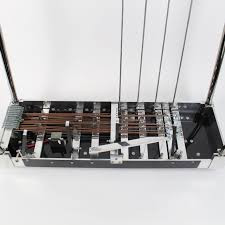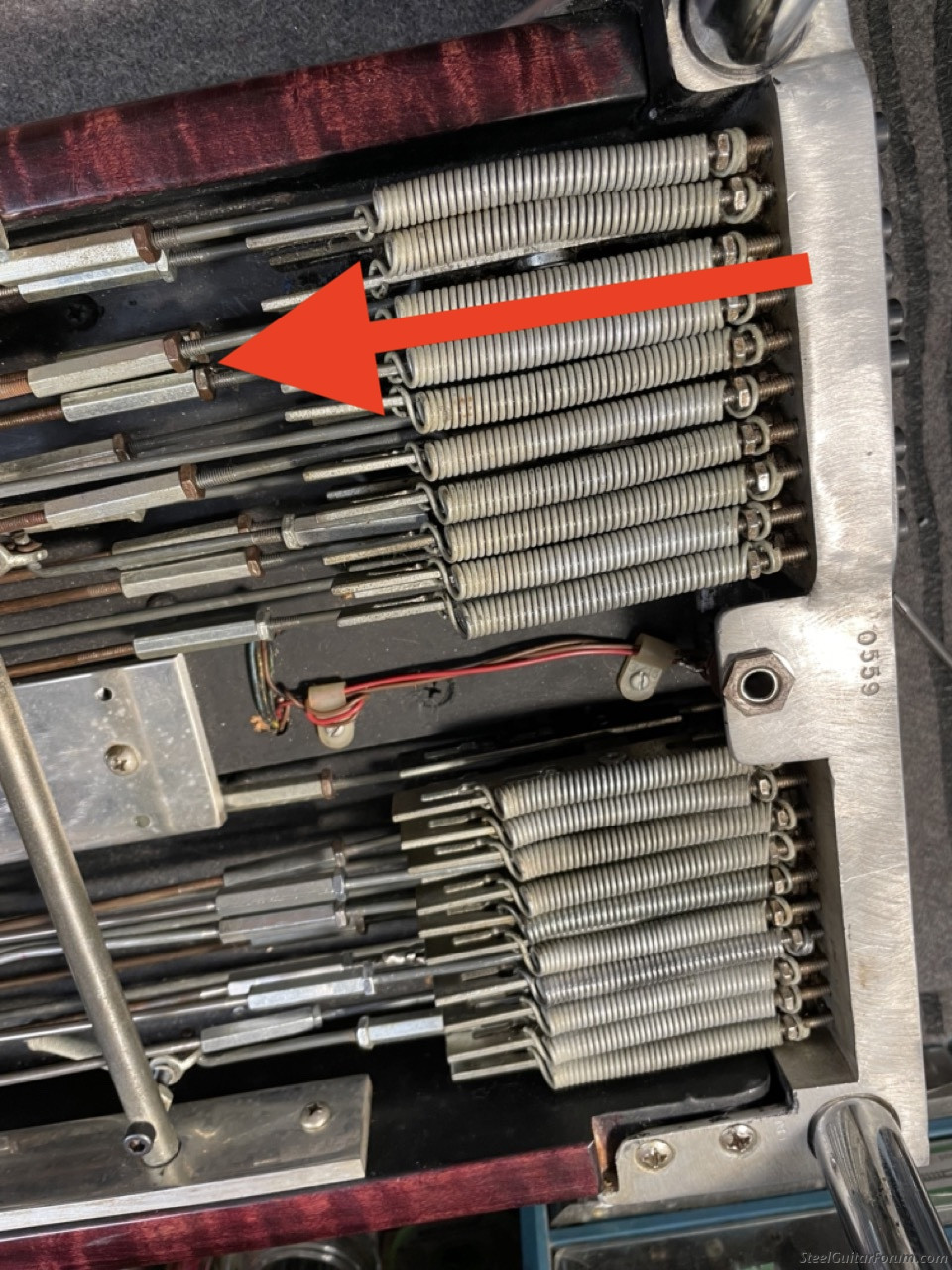| Author |
Topic: Zane Beck Guitars |
Tim Toberer
From:
Nebraska, USA
|
 Posted 21 Nov 2024 6:29 am
Posted 21 Nov 2024 6:29 am |
|
I came across a picture of the underneath of one of these old guitars and at first glance had no idea what I was looking at. After looking at a few more pictures, I think I see what is going on. These guitars use a completely different approach it seems. The downside is I think they must be really heavy, but they sure look bulletproof! It is getting me to think about some other ways of doing things.

 |
|
|
 |
George Piburn
From:
The Land of Enchantment New Mexico
|
 Posted 21 Nov 2024 8:44 am Eveners
Posted 21 Nov 2024 8:44 am Eveners |
|
Kline used the same devices , they are Eveners --
in the Horse business, like a stage coach or wagon to keep 2 horses at an even pulling power when they move at different speeds.
On pedal steel when a pedal is engaged, typically two strings are pulled or lowered. In pretty much all cases one of those strings needs to pull further than the other.
On most steel guitars there are compensators - springs and other means to help these pulls go evenly , musically so to speak.
With eveners both strings start at the same point, and one will pull quicker than the other , ending at the final position at the same exact time. If you were to look at the undercarriage while engaging a pedal or leaver, you can visually see the evener move to do what I am trying to describe.
The concept works brilliantly, but not many folks would care to set up or later adjust this type set up. A main factor why other manufacturers have not gone this direction.
_________________
GeorgeBoards S8 Non Pedal Steel Guitar Instruments
Maker of One of a Kind Works of Art that play music too.
Instructional DVDs
YouTube Channel |
|
|
 |
Bobby D. Jones
From:
West Virginia, USA
|
 Posted 22 Nov 2024 11:23 pm
Posted 22 Nov 2024 11:23 pm |
|
The strings would not pull even, But will end up at the note required together. Some call it a double tree or single tree pull. This setup with some older guitars, Was one of the things that gave them their unique sound. 1 string would hit its note and stop, Then the double tree would arc and pull the other string to note. Giving the guitar a unique sound.
With a cross rod and bell crank set up, You time string pulls so they start together and obtain the the raise or lower stop at same time.
Some early steels with bell cranks also had double tree attached to the bell crank, That worked the same way. I think some Fender and Sho-Buds had double trees hooked to bell cranks, For strings 3-6 and 4-8. I know a Sho-Bud Mavrick used the double tree system. |
|
|
 |
Mike DiAlesandro
From:
Kent, Ohio
|
 Posted 23 Nov 2024 5:15 am
Posted 23 Nov 2024 5:15 am |
|
| Bobby D. Jones wrote: |
The strings would not pull even, But will end up at the note required together. Some call it a double tree or single tree pull. This setup with some older guitars, Was one of the things that gave them their unique sound. 1 string would hit its note and stop, Then the double tree would arc and pull the other string to note. Giving the guitar a unique sound.
With a cross rod and bell crank set up, You time string pulls so they start together and obtain the the raise or lower stop at same time.
Some early steels with bell cranks also had double tree attached to the bell crank, That worked the same way. I think some Fender and Sho-Buds had double trees hooked to bell cranks, For strings 3-6 and 4-8. I know a Sho-Bud Mavrick used the double tree system. |
Well Bobby, to say they don't start and stop evenly is a bit of a mis-conception.
They can be timed by adjusting the rod length, which is done by adjusting the turnbuckles that connect the left-threaded rod, to the right threaded spoke that connects to the changer... 6-40 threads for anyone that may be interested.
Mike D
 |
|
|
 |
Lee Baucum
From:
McAllen, Texas (Extreme South) The Final Frontier
|
 Posted 23 Nov 2024 5:44 am
Posted 23 Nov 2024 5:44 am |
|
NOTE: The second photo in the original post is that of a BMI guitar. Those guitars have a more traditional pulling system.
_________________
Lee, from South Texas - Down On The Rio Grande
There are only two options as I see it.
Either I'm right, or there is a sinister conspiracy to conceal the fact that I'm right.
Williams Keyless S-10, BMI S-10, Evans FET-500LV, Fender Steel King, 2 Roland Cube 80XL's,
Sarno FreeLoader, Goodrich Passive Volume Pedals, Vintage ACE Pack-A-Seat |
|
|
 |
Tim Toberer
From:
Nebraska, USA
|
|
|
 |
Eric Dahlhoff
From:
Point Arena, California
|
 Posted 23 Nov 2024 9:39 pm
Posted 23 Nov 2024 9:39 pm |
|
| Mike DiAlesandro wrote: |
They can be timed by adjusting the rod length, which is done by adjusting the turnbuckles that connect the left-threaded rod, to the right threaded spoke that connects to the changer... 6-40 threads for anyone that may be interested.
Mike D |
Like Mike said!
You can also fine tune the timing by choosing the different holes in the yokes (aka trees). And also adjusting the return springs. A properly adjusted ZB will have very smooth and even pulls. 
_________________
"To live outside the law you must be honest." (Bob Dylan) |
|
|
 |
Tim Toberer
From:
Nebraska, USA
|
|
|
 |
Mark Shuda
From:
Wisconsin, USA
|
 Posted 26 Nov 2024 9:50 am Point of View
Posted 26 Nov 2024 9:50 am Point of View |
|
I have always been of the opinion that these “ uneven” pullers give the BMI’s and ZB’s their very cool unique sound! I think Tom Brumley liked it too!!!!
_________________
Mark Twang |
|
|
 |




